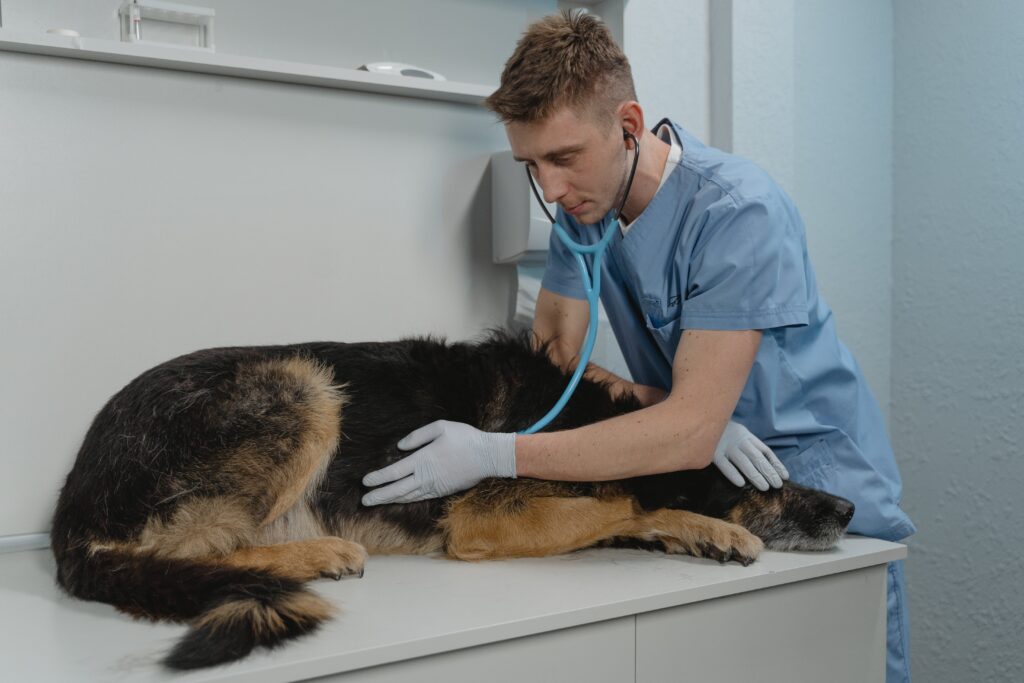Dogs, bred under selective selection, are highly susceptible to health problems, including genetic disorders. They are twice as likely to have a genetic disease than horses, and these diseases are often linked to domestication, particularly in animals bred under large numbers.
The OMIA database provides information on domestic and wild animals, birds, and fish, as well as information on their Mendelian Inheritance in Animals.. It demonstrates that among domestic animals, dogs have the greatest number of documented genetic disorders.
The information regarding the mode of inheritance of these disease genes is probably the best indicator. why dogs health problems have more genetic diseases problems than other animals. Sixteen out of 619 OMIA table traits/disorders have known mutation and inheritance mode, with 240 being Mendelian. Autosomal recessive disorders account for most of these disorders, with 240 being Mendelian.


How can I prevent my dog from genetic diseases & dogs health problems?
To reduce the rate of genetic diseases in dogs health problems, several tactics can be used.
Here are a few of them :-
1.Research breeds :- whether mixed or purebred, to understand their genetic susceptibility to specific conditions before purchasing a dog.
2. Pick a trustworthy breeder :- Look for a trustworthy breeder who tests their breeding dogs genetically and can give you the results.
3. Maintain a larger population of breeding animals :- Smaller populations are more likely to experience inbreeding, so keeping a larger population of breeding animals is the easiest method to slow down the rate of inbreeding.
4. Get free of popular sires:- Popular sires affect the gene pool in two ways. They not only decrease the quantity of animals raised for breeding, but they also raise the inbreeding rate.
5. Use strategic outcrossing to decrease inbreeding:- Outcrossing is the process of cross-breeding dogs to add new genetic material to the genetics by breeding them from different lines or breeds.
Tactics can reduce the risk of genetic diseases in dogs health issues symptoms, but no single genetic illness can be entirely eradicated. Genetic testing and conscientious breeding, however, can reduce the risks.
What is genetic testing?


Genetic testing is a diagnostic procedure that looks for variations in a person’s DNA. This tool aids in screening for genetic disorders before symptoms appear, confirming or denying suspected diseases, and estimating the likelihood of specific diseases.
Genetic testing comes in various forms :- carrier screening, pharmacogenetics, prenatal testing, presymptomatic and predictive testing, and diagnostic testing.
Genetic testing can identify changes to genes (mutations) that could lead to disease or illness. There are dogs health issues symptoms restrictions on genetic testing, even though it can offer valuable information for identifying, managing, and avoiding disease. For instance, a positive genetic test result does not guarantee the development of a disease in a healthy individual. However, in some circumstances, a negative outcome does not ensure that you will not experience a particular disorder.
It’s necessary to discuss your plans for the results of any genetic testing you are thinking about having done with your physician, a medical geneticist, or a genetic counsellor. They can assist you in understanding the advantages and restrictions of genetic testing as well as potential effects on your life and health.
Can I get a genetic test for my dog?
It is possible to obtain a genetic test for your dog. Dog genetic testing can reveal details about your dog’s distinct genetic makeup and is comparable to testing for human DNA. Dog genetic testing is provided by a number of companies, including Wisdom Panel, Embark, and DNA My Dog. For mixed breeds, these tests can assist in identifying the breed and identify potential genetic health risks as well as other traits.
DNA from a dog’s cheek or blood sample is used for canine genetic testing, which is then examined by a laboratory and results are typically returned within weeks.
When testing your dog, it’s crucial to choose a reputable breeder that conducts genetic testing and provides the results. Additionally, you should discuss with your veterinarian the advantages and restrictions of genetic testing as well as any potential effects the results may have on your dog’s life and dogs health issues symptoms.
What are some common genetic diseases in dogs?


These are a few of the more typical ones :-
1. Hip dysplasia :- A bone disorder characterized by pain from an improper alignment of the hips’ ball and socket. While all breeds are prone to this disease, the most prevalent victims are enormous and gigantic breeds including Mastiffs, Bernese Mountain Dogs, Great Danes, Newfoundland, and Rottweilers.
2. Ruptured or ruptured cranial cruciate ligament :- This condition results in weakness or the inability of the dog to bear weight on the injured leg. Large breeds are more susceptible to the effects, but any breed can be affected the dogs health issues symptoms.
3. Progressive retinal atrophy :- A set of genetic eye conditions that result in retinal degeneration and may eventually cause blindness. While it can afflict any breed, some breeds are more susceptible to it than others, such as Miniature Schnauzer dogs, Irish Setters, and Cocker Spaniels.
4. Von Willebrand’s disease :- A bleeding illness brought on by a lack of the protein von Willebrand factor, which aids in blood clotting. While it can afflict any dogs breed health problems, some breeds are more susceptible to it than others, such as German Shepherds, Doberman Pinschers, and Golden Retrievers.
5. Epilepsy :- Seizures are a neurological disorder. While it can affect any breed, some breeds are more likely to experience this condition than others, such as Beagles, Belgian Truven’s, and Golden Retrievers.
It’s crucial to remember that although these are some of the most prevalent genetic illnesses in dogs health issues symptoms , there are a wide range of other conditions to which dogs may be susceptible. Whether you’re thinking about getting a mixed breed or purebred dogs health problems, it’s important to learn about the breed’s genetic condition predisposition. Genetic testing and responsible breeding are other ways to reduce the risks.
What is responsible breeding?
A careful and moral method of producing puppies, responsible breeding entails a dedication to improving the breed, maintaining its distinctive features, and adding the health and disposition of succeeding generations. It involves mating only in good health and breed-true animals. Breeders of responsible dogs spend time in learning everything they can about AKC regulations, canine health and training, and their breed. They can provide you with the results of the genetic testing they do on their breeding dogs health problems and solution.
An comprehensive handbook on ethical dog breeding, published by the American Kennel Club (AKC), details the steps needed in creating a litter of pups. Preparing for a litter of puppies, breeding to advance the breed, selecting a compatible mate, understanding your genetic makeup, completing pre-breeding health examinations, and registering your litter with the AKC are a few of the crucial steps.
Whether your dog is a mixed breed or purebred, it is important to learn about the breed’s genetic condition predisposition if you are thinking about breeding it. Genetic testing and dedicated breeding are other ways to reduce the risks of dogs health issues and symptoms.


Can mixed dog breeds be responsibly breed?
You can responsibly breed mixed breed dogs. It’s crucial to remember that mixed-breed dogs are not naturally immune to genetic illnesses. Mixed breeds are susceptible to rare breed-related disorders, but they are also equally susceptible to common genetic diseases that affect all breeds. Genetic testing and conscientious breeding, however, can reduce the risks.
Whether your dog is purebred or mixed, it’s crucial to learn about the breed’s tendency to particular genetic disorders if you plan to breed it. Genetic testing and conscientious breeding are other ways to reduce the risks.
What is the difference between a purebred and mixed breed dog?


A dog that can be traced back to only one breed is said to be purebred. Every member of the dog’s family tree belongs to the same breed. Purebred dogs undergo rigorous breeding to ensure their temperament, behavior, and physical characteristics, which are often linked to predictability in terms of activity level, temperament, size, and grooming requirements.
A dog with mixed breed genetics, on the other hand, possesses behaviors from multiple breeds. Mixed breed dogs, also known as mutts or mongrels, have a diverse family tree and unclear heritage, making it difficult to predict their offspring’s form.
While mixed-breed dogs are frequently linked to genetic diversity and hybrid power, purebred dogs are typically associated with stability. There is no statistically significant difference in the prevalence of genetic disorders between mixed-breed dogs and purebred dogs, according to certain studies.
It’s crucial to remember that both purebred and mixed-breed dogs can make wonderful companions, and the choice of which breed to get ultimately comes down to your preferences and way of life.

